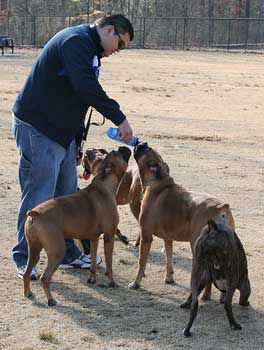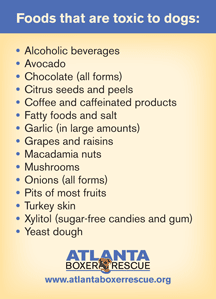Feeding
 Feeding your dog a high quality diet is one of the most important things you can do to ensure that they live a long and healthy life. There are a lot of choices out there when it comes to dog food and it is important to do your research, because not all dog food is equal. There are a lot of bad foods out there.
Feeding your dog a high quality diet is one of the most important things you can do to ensure that they live a long and healthy life. There are a lot of choices out there when it comes to dog food and it is important to do your research, because not all dog food is equal. There are a lot of bad foods out there.
You have two main choices when it comes to feeding your boxer. You can homecook for your boxer or feed a commercial diet (dry kibble or canned food.) If you decide to homecook for your dog, please do research on the meals that you prepare to ensure that your boxer is receiving everything that they need for a complete and balanced diet. Balanceit.com is a good resource. Try to avoid exotic ingredients.
Feeding a commercial diet is the most common choice. "What food should I feed my dog?" is such a common question. Unfortunately, there is no good answer. Every dog is different, and there is no perfect food that works for all dogs. You will have to do some research, and try some different brands before you find the food that is right for your dog. Most quality dog foods are not sold in supermarkets, or even in large chain pet stores (although they do usually carry at least one or two premium brands). The best place to shop for dog food is at your local feed store, or pet supply shop. And don't worry. The premium brands usually work out to be the same price, or even cheaper than the big name brands!
If you decide to feed your boxer a commercial kibble, it is important that you understand how to read and interpret ingredient labels so that you know how to choose a quality food. Ingredients are listed by weight, similar to the ingredients on human food. Therefore the first ingredients are what make up the majority of the food. Dogs are omnivores and need vegetables in their diets, but you want the first ingredients to be some form of meat. Beware the common practice of "Ingredient Splitting" This is where one ingredient is broken up and listed separately in the list, so that it appears like there is less of it in the food. For example, if the ingredients list reads "Chicken meal, Rice, Rice Bran" then there is a good chance that there is actually more rice in the food than chicken, because rice and rice bran are both rice.
Corn and wheat gluten are fine, but unless it is a special prescription food (such as Hills I/D for GI issues) avoid foods that contain wheat, corn and soy as one of the main ingredients high up on the list. These ingredients can be fillers that provide little nutritional value for your dog and are sometimes used because they are cheap and easy for a dog food company to obtain. Wheat and corn are two of the biggest causes of food allergies and because boxers as a breed are prone to food allergies, it is especially important for you to be vigilant about what feed your boxer. If your dog doesn't like the food, try a different protein source. Common proteins are beef, chicken, lamb, and salmon. Your dog might like one flavor better than another or have an easier time digesting certain foods.
As you start reading dog food labels, you will see meat ingredients listed in three different ways. Meat, Meat by-products and Meat meal. By-products are generally a very low quality ingredient. They are all of the bits of the animal that are leftover after processing for human consumption. Avoid foods that contain by-products. Meat Meal is actually the best term to see. It is the same as Meat, but with the water removed. Because the water must be removed in order to make kibble, if you see an ingredient listed as just meat, it should actually be further down in the ingredient list than it is.
Another important thing to look for is that all meat ingredients should be identified as coming from a specific animal. For example, you want to see chicken meal, not poultry meal, or meat meal. If the specific animal is not identified it is because the ingredient is of such low quality that the producer either could not, or did not want to identify what animal the ingredient came from.
Certain known carcinogens are allowed to be used in dog food. These ingredients include BHA and BHT (common preservatives) and ethoxyquin (commonly found in fish). Avoid foods that contain BHA and BHT, or foods that contain fish that is not specified as ethoxyquin free.
Puppy Food
Many of the puppy foods available today are largely marketing gimmicks. Your puppy has the same basic nutritional needs as that of a grown dog, so as long as you're feeding a high quality dog food, and feeding the right amount according to the puppy guidelines printed on the bag, then your puppy should be getting everything that he or she needs. One important thing to look at is the amount of protein in the food. Your puppy needs a minimum of 22% protein, but not more than 26%. Foods with protein levels higher than 26% are only appropriate for dogs over 18 months of age. Higher protein levels can cause your boxers musculoskeletal system to develop too quickly, which can cause bone and joint problems later in life.
Treats
Remember that treats are just as much a part of your dogs diet as the food they eat every day. If you are purchasing dog biscuits, make sure to review the ingredient list using the same guidelines explained above. There are actually a lot of human foods you can use as treats that are very healthy for dogs. Raw fruits and veggies, cheese, boiled chicken and natural peanut butter are all good.
A great treat to keep your dog occupied for a while is a Kong toy (it is a red rubber cone shaped toy that is hollow and can be stuffed with treats) filled with any combination of peanut butter, dog food, plain yogurt and banana. Freeze it, and give it to your boxer whenever you want an hour of peace. They will sit quietly with it till they have licked it clean.
Digestion Tips
- If your boxer has gas (and he will!) add a spoonful of plain, nonfat yogurt to his food every day. It will help.
- If your boxer has loose stools, add a spoonful of plain canned pumpkin (not pumpkin pie filling!) to his food to help firm things up.
ABR Statement on food related Dilated Cardiomyopathy
As many of you may already be aware, the FDA released a new report on June 27th regarding a correlation between Dilated Cardiomyopathy (DCM) in dogs eating certain diets, many of which are labeled as grain free. These grain free diets contain peas, lentils, and other legumes and/or potatoes as main ingredients. Between January 1st 2014 and April 30th 2019 515 canine reports (560 affected) were received by the FDA with 219 being reported between December 1st 2018 and April 30th 2019. These are cases in which DCM has been diagnosed and the FDA did not include reports without a DCM diagnosis. An echocardiogram (ultrasound of the heart) is required to definitively diagnose DCM. The reports include a thorough medical history including echocardiogram results and a detailed history of the diet being fed.
DCM is a disease of the heart which results in the decreased ability to pump blood throughout the body due to weakened contractions. As the disease progresses the heart becomes enlarged and it can lead to congestive heart failure (CHF). This is a silent disease where there may be no symptoms early on. There are certain breeds that are genetically predisposed which include Boxers, Dobermans, Great Danes, and Cocker Spaniels. Genetic or traditional DCM is different than Nutritional DCM. Genetic DCM is typically progressive with no cure and has a poor prognosis. Nutritional DCM, depending on when it is diagnosed, may be curative with medications, supplementation, and a diet change.
In the early stages there may not be any symptoms but it typically starts with a noticeable exercise intolerance. Symptoms can include: heart murmur/abnormal heart sounds, lethargy/weakness, weight loss, coughing, difficulty breathing, and collapse.
Boxers are already a high-risk breed for developing heart disease. In the FDA report boxers rank #10 out of 19 breeds listed. At this time there is still a lot of unknown, however DCM is a serious disease that can be fatal and everyone needs to be aware of it. The FDA as well as other institutes are continuing to research and investigate into the correlation between diets and ingredients. If you are currently feeding one of the brands listed in the report the best thing to do is to contact your veterinarian to discuss their recommendations regarding a diet change. You can also seek a referral to a veterinary cardiologist or nutritionist from your veterinarian.
The FDA report can be found here:https://www.fda.gov/animal-veterinary/news-events/fda-investigation-potential-link-between-certain-diets-and-canine-dilated-cardiomyopathy
We encourage you to join this Facebook group (Taurine-Deficient (Nutritional) Dilated Cardiomyopathy Group) which has a wealth of information regarding nutritional DCM. Members include veterinarians, board-certified veterinary nutritionists and cardiologists as well as members who have experienced nutritional DCM firsthand with their own pets. You can also visit the website associated with this group: https://taurinedcm.org/
How to choose a dog food
You may be asking how to choose a dog food? We recommend you start by consulting your veterinarian. Secondly, look for a manufacturer which employs a full-time board certified (ACVN) veterinary diplomate. The Pet Nutrition Alliance (PNA) is a group of board certified veterinary nutritionists, veterinarians, veterinary technician specialists and registered veterinary technicians who promote the importance of nutrition in pets worldwide. The PNA recently conducted a survey asking manufacturers the following questions:
- Are they a contract manufacturer who outsources production of their food to other manufacturers or plants.
- Do they have nutritional experts on staff, and if so, what are their titles? (ACVN diplomates, veterinary nutritionists, etc.)
- Do they own their own manufacturing plants?
- Do they provide nutritional information?
- Do they do a minimum of six months of trials on all foods?
The following manufacturers employ full-time AVCN diplomates, nutritionists with PhD and MS in animal nutrition: Purina, Royal Canin, Hills. See where your brand ranks in the survey by visiting: www.petnutritionalliance.org/chart
We are currently recommending Purina Pro Plan for our fosters and we feed it to our own boxers. as well.
Purina Pro Plan, Hills Science Diet, Eukanuba, Iams and Royal Canin are the brands that are considered safe by our veterinarians.
Additional Reading
- A recent blog post from Dr. Weeth, a veterinary nutritionist: https://weethnutrition.wordpress.com/2019/07/02/update-on-diet-associated-dilated-cardiomyopathy-july-2-2019
- Articles from Tufts University: https://vetnutrition.tufts.edu/2018/06/a-broken-heart-risk-of-heart-disease-in-boutique-or-grain-free-diets-and-exotic-ingredients
- https://vetnutrition.tufts.edu/2018/11/dcm-update/
Sources: "Canine Dilated Cardiomyopathy (DCM)." Cornell University College of Veterinary Medicine, 6 Feb. 2018, www.vet.cornell.edu/hospitals/companion-animal-hospital/cardiology/canine-dilated-cardiomyopathy-dcm.
"Dilated Cardiomyopathy in Dogs." VetMed, www.vetmed.wsu.edu/outreach/Pet-Health-Topics/categories/diseases/dilated-cardiomyopathy-in-dogs.
Resources
Toxic Foods
Click here to download and print this list of foods toxic to dogs for yourself! Place it in on your refrigerator or near your dog's food. There are four to a page - cut one out for yourself and share the others with your dog friends.
The Whole Dog Journal
www.whole-dog-journal.com
This is a publication which contains tips and guidelines for natural dog care and training. Each year they put out a list of the best dry and wet dog foods available. It is an invaluable resource for any dog owner.

